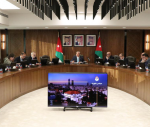You are here
The growing Sahel crisis
Aug 17,2023 - Last updated at Aug 17,2023
STOCKHOLM — In recent years, domestic developments in Niger, indeed, across North Africa’s Sahel region, scarcely attracted attention from the wider world, except in Paris, where French policymakers still took an interest in Francophone Africa. But the military coup in Niger on July 26 has changed everything.
Previously relatively stable and democratic, Niger was seen as the last bulwark against the spread of violence and political turmoil across the region, much of it incited by extremist movements tied to Al Qaeda and Daesh. Owing partly to the civil war in Libya, these groups managed to take over northern Mali in early 2012, thus forcing France to intervene militarily to prevent the capital, Bamako, from falling into the hands of extremist insurgents.
That episode inaugurated a decade of international military engagement to contain the extremism threat and stabilise the region. Military operations conducted by France, the European Union, the United States and African governments followed one after another. The largest, a United Nations mission deployed to Mali in 2013, marshaled some 15,000 peacekeepers.
Meanwhile, the EU sent training missions, France pursued separate counterterrorist operations, and the US gradually increased its involvement by providing military and other forms of support.
Despite their scale, these interventions were only partly successful. A 2015 peace agreement, concluded in Algiers, sought to bridge the political divide between northern and southern Mali, but it was far from perfect. The country’s security situation slowly deteriorated again, and, in 2020, Mali suffered a coup, followed by another just a year later.
The coup leaders then turned against the prevailing international engagement efforts in the country. In late 2021, they invited the Russian mercenary Wagner Group to provide security assistance and asked the French to leave. The result has been greater domestic insecurity. Wagner has occupied France’s former bases and conducted operations with scant regard for civilian lives. One of its top priorities has been to secure access to Mali’s economic resources, chiefly minerals.
Earlier this year, the coup regime asked the UN to leave. The peacekeepers are now packing up and will be gone before the end of the year. There is little left of the Algiers agreement, and extremist groups have seized control of most of the country’s north. From there, they have exported violence to nearby Burkina Faso, which consequently had two coups in 2022. Burkina Faso’s own coup regime has since followed the Mali model and reportedly brought in Wagner, repeating the same cycle and further undermining security both in that country and across the region.
It was in this context that Niger’s current crisis emerged. One of the world’s poorest countries, Niger is also one of the youngest. Its population of around 25 million is expected to reach almost 70 million by mid-century. With most of the country’s territory comprising barren desert, the government depends on foreign aid for around 40 per cent of its budget.
But owing to its democratic credentials and its relatively strong record of fighting extremist and (now) Russian-inspired instability, it had become a hub for international engagement efforts in the region. Josep Borrell, the EU’s High Representative for Foreign Affairs and Security Policy, just visited the country in early July. While there, he praised President Mohamed Bazoum, who has since been detained, for what his administration had achieved, visited an EU security mission, and cut the ribbon on a vast new solar-power plant.
The US, too, has been increasing its presence in Niger, spending $110 million on a drone base near the city of Agadez. At the time of the coup, more than a thousand American personnel were in the country. Similarly, France had 1,500 soldiers in Niger, and they had been joined by troops from Italy, Germany and Canada.
These cascading coups pose a profound threat to West Africa’s remaining democracies. The region’s largest power, Nigeria, has been spearheading the wider response, with its recently elected president, Bola Ahmed Tinubu, going so far as to threaten a military intervention against the Niger coup-makers. While diplomacy is to be preferred, the Nigerians’ interest in their neighbour is understandable. They have too much at stake to be indifferent.
In fact, the same goes for Europe and many others, whether or not they want to accept it. A gradual breakdown of governance in West Africa would open the door for a further expansion of Daesh and al-Qaeda affiliates, and these groups’ influence would give rise to humanitarian, security and migration challenges for which there would be no easy answers. It is not just the West and Niger’s neighbors that should be concerned. As the second-biggest investor in Niger, so, too, should China.
For now, one hopes that robust regional diplomacy will allow for a return to stability in Niger. But if diplomacy fails, other options, such as a contested military intervention, will become more likely, bringing still more problems to an already fraught region.
Carl Bildt is a former prime minister and foreign minister of Sweden. Copyright: Project Syndicate, 2023. www.project-syndicate.org













